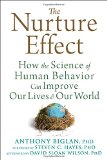
The Nurture Effect: How the Science of Human Behavior Can Improve Our Lives and Our World by Anthony Biglan (New Harbinger, 2015)
(kindle ed.), (amazon.co.uk), (UK kindle ed.)
Book description from the publisher:
A fascinating look at the evolution of behavioral science, the revolutionary way it’s changing the way we live, and how nurturing environments can increase people’s well-being in virtually every aspect of our society, from early childhood education to corporate practices. If you want to know how you can help create a better world, read this book.
What if there were a way to prevent criminal behavior, mental illness, drug abuse, poverty, and violence? Written by behavioral scientist Tony Biglan, and based on his ongoing research at the Oregon Research Institute, The Nurture Effect offers evidence-based interventions that can prevent many of the psychological and behavioral problems that plague our society.
For decades, behavioral scientists have investigated the role our environment plays in shaping who we are, and their research shows that we now have the power within our own hands to reduce violence, improve cognitive development in our children, increase levels of education and income, and even prevent future criminal behaviors. By cultivating a positive environment in all aspects of society—from the home, to the classroom, and beyond—we can ensure that young people arrive at adulthood with the skills, interests, assets, and habits needed to live healthy, happy, and productive lives.
The Nurture Effect details over forty years of research in the behavioral sciences, as well as the author’s own research. Biglan illustrates how his findings lay the framework for a model of societal change that has the potential to reverberate through all environments within society.
Google Books preview:
See also: Book website




